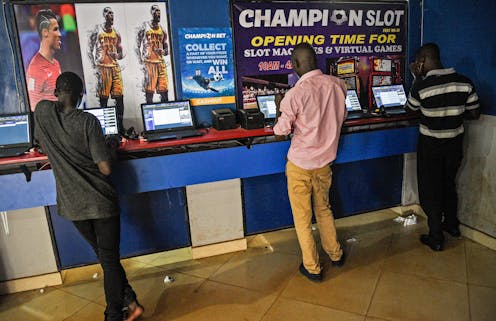
Betting on soccer games is a popular pastime in many African countries. A 2024 report by GeoPoll found that 76.16% of respondents from Kenya, South Africa, Ghana, Uganda, Tanzania and Nigeria had gambled or placed bets and that soccer was by far the most popular sport to bet on. Young men (aged 16 to 34) make up the bulk of soccer bettors in those countries.
Much has been written about the negative aspects of sports betting, including the risk of gambling addiction and becoming involved in money laundering. But, as we show in recent research from Zimbabwe, there are perhaps surprising upsides to the practice, too.
We examined how young men in urban Zimbabwe used soccer betting to mitigate the effects of unemployment and to earn an income. We found that, in addition to being a source of income, betting also promotes the adoption of digital technologies among this group. It provides them with an opportunity to learn digital, internet, research, and networking and collaboration skills that they might not have developed in school.
This means that what outsiders might view as wasted time is actually being used productively to prepare for the future. The skills our participants learn through soccer betting are useful for finding jobs and in other areas of life.
The waiting game
In many African nations, young people wait for long periods after completing secondary school and tertiary education before they can get stable employment, earn reliable incomes, acquire assets, start families, and fully transition to adulthood. This is because of poor economic and industrial growth.
During this waiting period, (often called “waithood”), they engage in various activities, mostly in the informal sector, outside the formal economy and job market.
Some continue with their education, hoping that additional qualifications will make them more competitive. Others take jobs in small informal enterprises across different trades, such as music, farming and forex trading, either full-time or part-time. Some start their own small businesses.
Read more: Why smartphone gambling is on the up among African millennials
Collectively these activities are commonly known as “hustling”. The participation of young unemployed people in hustle activities as they wait for better opportunities is well-documented across different countries. In Kenya, for instance, President William Ruto highlighted hustling as a significant economic activity during his Every Hustle Counts campaign in the run up to the 2022 election; the strategy has been credited with securing him the youth vote.
What we found
Many of Zimbabwe’s young people are also hustling. Our research focused on unemployed men aged between 18 and 38, in the country’s capital city, Harare, and Norton, a town about 40km west of Harare. Some participants had completed secondary school and not gone on to tertiary education; others were university or college graduates.
Read more: A South African case study: how to support young job hunters
Participants told us that they bet manually and online. Both approaches require current soccer information to make informed bets. This involves analysing various aspects of soccer, including leagues, teams, and players. Most bettors focus on international soccer and rely on the internet for this information.
Before placing bets, they research information, such as match fixture dates and times, team/player performance, injuries, and potential line-ups. Bettors rely on information such as soccer statistics, news, and video highlights to make better decisions. They also consult internet sources and social media (YouTube, Twitter, Facebook), watch expert analyses and predictions, and use WhatsApp for information sharing. Additionally, they watch live matches and use websites and applications such as Score808, Hesgoal, AiScore, and Crowd Scores to stay updated on games which they cannot watch.
One told us:
To be a successful punter, you must have some digital and internet skills. You should know how and where to get information quickly. You should also know how to operate your phone, tablet or laptop; otherwise, without such skills, the devices will not serve you.
Devices and skills
As this comment suggests, internet access alone is not enough. Though some betting stores provided internet-connected desktops for those without smartphones or internet data, bettors felt it was necessary to have their own digital devices. All our participants owned at least a smartphone, tablet, laptop, or desktop computer, and products such as power banks, chargers, and portable wifi devices.
Some used their betting profits to buy new devices with improved storage memory and battery life.
Our participants developed a number of skills while using their devices. These included general device operation, typing, internet usage, retrieving information, downloading and organising documents, images, videos, and audio files. Some bettors took advantage of their existing digital skills to support their betting activities, while others acquired these skills through self-training and consulting with others.
One bettor, reflecting on how much he’d learned about the internet, said:
Before joining soccer betting, I was unable to use the internet. However, I realised that to successfully bet, I should have up-to-date information, and this forced me to learn how to use the internet. Now I am a pro and I also use the internet for other purposes in addition to betting.
Collaboration and networking were a key part of their approaches to betting. Many of our participants used social media, particularly WhatsApp and Facebook, to share ideas and important information. By teaming up online, they divided research tasks and were able to give each other feedback in real time.
Not wasted time
Our research shows that “waithood” does not automatically equate to wasted or lost time. Young people can use this period to improve and upskill themselves, even in very small or informal ways, as in the case of our soccer bettors.
The authors do not work for, consult, own shares in or receive funding from any company or organisation that would benefit from this article, and have disclosed no relevant affiliations beyond their academic appointment.
This article was originally published on The Conversation. Read the original article.







